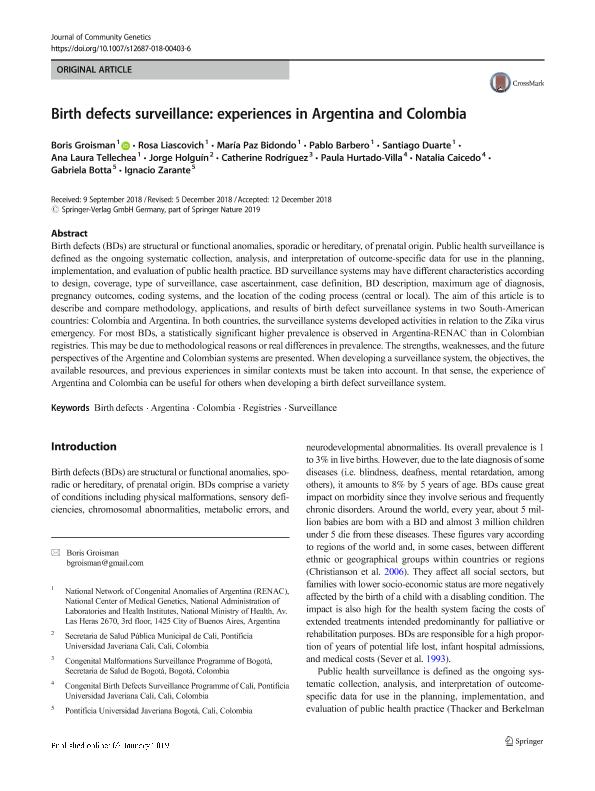Artículo
Birth defects surveillance: experiences in Argentina and Colombia
Groisman, Boris ; Liascovich, Rosa
; Liascovich, Rosa ; Bidondo, Maria Paz; Barbero, Pablo Miguel; Duarte, Santiago Pablo; Tellechea, Ana Laura; Holguín, Jorge; Rodríguez, Catherine; Hurtado Villa, Paula; Caicedo, Natalia; Botta, Gabriela; Zarante Montoya, Ignacio Manuel
; Bidondo, Maria Paz; Barbero, Pablo Miguel; Duarte, Santiago Pablo; Tellechea, Ana Laura; Holguín, Jorge; Rodríguez, Catherine; Hurtado Villa, Paula; Caicedo, Natalia; Botta, Gabriela; Zarante Montoya, Ignacio Manuel
 ; Liascovich, Rosa
; Liascovich, Rosa ; Bidondo, Maria Paz; Barbero, Pablo Miguel; Duarte, Santiago Pablo; Tellechea, Ana Laura; Holguín, Jorge; Rodríguez, Catherine; Hurtado Villa, Paula; Caicedo, Natalia; Botta, Gabriela; Zarante Montoya, Ignacio Manuel
; Bidondo, Maria Paz; Barbero, Pablo Miguel; Duarte, Santiago Pablo; Tellechea, Ana Laura; Holguín, Jorge; Rodríguez, Catherine; Hurtado Villa, Paula; Caicedo, Natalia; Botta, Gabriela; Zarante Montoya, Ignacio Manuel
Fecha de publicación:
12/2018
Editorial:
Springer Verlag Berlín
Revista:
Journal of Community Genetics
ISSN:
1868-310X
e-ISSN:
1868-6001
Idioma:
Inglés
Tipo de recurso:
Artículo publicado
Clasificación temática:
Resumen
Birth defects (BDs) are structural or functional anomalies, sporadic or hereditary, of prenatal origin. Public health surveillance is defined as the ongoing systematic collection, analysis, and interpretation of outcome-specific data for use in the planning, implementation, and evaluation of public health practice. BD surveillance systems may have different characteristics according to design, coverage, type of surveillance, case ascertainment, case definition, BD description, maximum age of diagnosis, pregnancy outcomes, coding systems, and the location of the coding process (central or local). The aim of this article is to describe and compare methodology, applications, and results of birth defect surveillance systems in two South-American countries: Colombia and Argentina. In both countries, the surveillance systems developed activities in relation to the Zika virus emergency. For most BDs, a statistically significant higher prevalence is observed in Argentina-RENAC than in Colombian registries. This may be due to methodological reasons or real differences in prevalence. The strengths, weaknesses, and the future perspectives of the Argentine and Colombian systems are presented. When developing a surveillance system, the objectives, the available resources, and previous experiences in similar contexts must be taken into account. In that sense, the experience of Argentina and Colombia can be useful for others when developing a birth defect surveillance system.
Palabras clave:
ARGENTINA
,
BIRTH DEFECTS
,
COLOMBIA
,
REGISTRIES
,
SURVEILLANCE
Archivos asociados
Licencia
Identificadores
Colecciones
Articulos(SEDE CENTRAL)
Articulos de SEDE CENTRAL
Articulos de SEDE CENTRAL
Citación
Groisman, Boris; Liascovich, Rosa; Bidondo, Maria Paz; Barbero, Pablo Miguel; Duarte, Santiago Pablo; et al.; Birth defects surveillance: experiences in Argentina and Colombia; Springer Verlag Berlín; Journal of Community Genetics; 10; 3; 12-2018; 385-393
Compartir
Altmétricas



